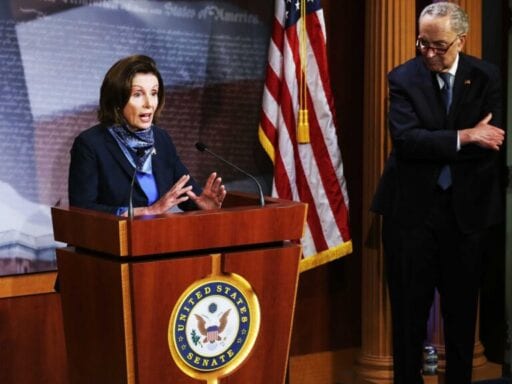It also includes additional money for hospitals and testing.
The House has passed a $480 billion funding bill aimed at tiding over small businesses during the coronavirus pandemic. It now heads to President Donald Trump’s desk, where he’s expected to sign it.
The bulk of the bill is dedicated to replenishing funds for the Paycheck Protection Program, a critical new program that provides small businesses with forgivable loans to cover payroll costs. While lawmakers allocated $350 billion to PPP in the March stimulus package, those funds were ultimately far from enough to address the need of millions of small businesses in the US.
Thus far, 1.6 million small businesses have received funding from PPP, according to the Small Business Administration, but hundreds of thousands are still waiting to hear on their application status after money for the program ran out last week. Millions of dollars have also gone to large corporations because of a loophole in the original bill.
The House’s passage of another spending package infuses $310 billion into PPP, with an added $10 billion set aside to cover administrative costs. There’s also $60 billion allocated in the legislation for the Economic Injury Disaster Loans Program, which covers forgivable grants for small businesses.
The remainder of what lawmakers are calling an “interim” spending bill contains $75 billion for hospitals to cover growing revenue shortfalls and $25 billion for coronavirus testing.
The final version of the legislation, however, does not meaningfully address the loophole that has allowed publicly traded companies to hoover up large amounts of the relief funds. It’s also missing several key Democratic priorities, such as more funding for states and cities, as well as additional money to expand SNAP benefits.
Because of this — and other shortcomings — progressive groups have come out against the bill, and argued that it once again pushes debates about more funding to the next package, which could face serious opposition from Senate Republicans.
Rep. Alexandria Ocasio-Cortez has said she opposes this interim bill as well. “If we’re going to say that this new bill is going to give us $5, and then Congress is going to peace out for another month-long recess, I’m here to say that’s not going to help our communities,” Ocasio-Cortez said earlier this week.
What the bill contains
Due to Democratic pressure, the “interim” funding bill has expanded notably since Senate Republicans’ initial proposal.
The original Republican offer, announced roughly two weeks ago, was limited to $250 billion in funding for the Paycheck Protection Program, which provides forgivable grants to businesses and nonprofits. The newer version includes $320 billion for PPP, and $60 billion for the Economic Injury Disaster Loan program.
Of the $320 billion allocated for PPP, there’s also a $60 billion carve-out for community-based lenders, as well as mid-sized banks, which can better serve smaller businesses and minority-owned firms. These businesses are less likely to have an existing relationship with a larger bank and were more likely to get shut out in the first round of funding as a result.
Additionally, the deal contains $75 billion for hospitals, which have been overwhelmed by the simultaneous costs of preparing for the coronavirus and the revenue declines that have resulted as elective procedures are postponed.
Another $25 billion in the legislation is intended to help ramp up the country’s testing capacity, a development that experts view as vital to determining when to reopen the economy more fully. Those funds include $11 billion specifically allocated to states for test supplies, contact tracing efforts, and staffing. Much of the remainder of these testing funds are spread across different federal agencies working on testing, including the National Institutes of Health.
The main Democratic demand that has been omitted from this deal is the additional funding that lawmakers would like to see go to cities and states, many of which are facing incredible financial strain given reductions in tax revenue. Mnuchin signaled that this would be addressed as part of negotiations for the next funding bill, though Congressional Republicans have indicated that they’re likely to push back on this provision.
“The president has heard from the governors and he’s prepared to discuss that in the next bill,” Mnuchin said during an appearance on CNN’s State of the Union last weekend.
Trump’s reluctance to consider state funding in the current bill is the result of a couple of factors, according to Politico. Among them: The administration is concerned that it would have less leverage over the states regarding when they reopen their economies if they had more funding to help them weather this period.
Senate Republicans, it appears, are also concerned about the impact of more stimulus spending on the national debt. In a radio interview on The Hugh Hewitt Show this week, McConnell said that he was wary of approving more aid for states and cities. “I think this whole business of additional assistance for state and local governments needs to be thoroughly evaluated,” he said.
Given the evident disagreements between the two parties on next steps, it could be a while before the next stimulus package is approved.
Support Vox’s explanatory journalism
Every day at Vox, we aim to answer your most important questions and provide you, and our audience around the world, with information that has the power to save lives. Our mission has never been more vital than it is in this moment: to empower you through understanding. Vox’s work is reaching more people than ever, but our distinctive brand of explanatory journalism takes resources — particularly during a pandemic and an economic downturn. Your financial contribution will not constitute a donation, but it will enable our staff to continue to offer free articles, videos, and podcasts at the quality and volume that this moment requires. Please consider making a contribution to Vox today.
Author: Li Zhou
Read More



